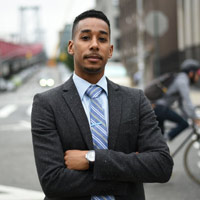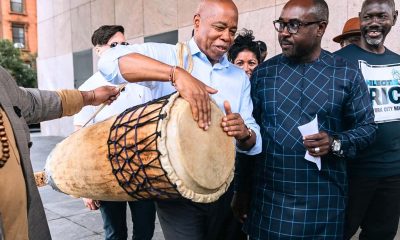Community News
Top City Leaders Open 2023
Addressing Grassroots Issues, and Poised to Work

BK BOROUGH PRESIDENT ANTONIO REYNOSO’S
2023 STATE OF THE BOROUGH ADDRESS, MESSAGE
Promises Continued Strategic Focus on Building “Lifeboats for the Neighborhoods”
Brooklyn Borough President Antonio Reynoso — the first Latino Brooklyn Borough President, first Borough President citywide, and the youngest Borough President ever elected in the history of the City of New York — delivered on Tuesday, January 10, 2023, Brooklyn’s first State of the Borough address in nearly ten years at New York City College of Technology.

The Borough President holds these distinctions as leader of the most populous Borough in America’s largest city. As Brooklyn’s first Millennial-born leader, Reynoso is also creating solid launch-pad policies for the next-in-line Z and Alpha Generations.
The City’s top leaders joined the Borough President: Brooklyn’s own Senate Majority Leader Chuck Schumer, who also gave remarks; Mayor Eric Adams, Public Advocate Jumaane Williams, New York City Comptroller Brad Lander, his fellow Borough Presidents, and many other city, state, and federal elected officials.
The event honored what Reynoso called his “year of firsts” — history-making maternal health investments, the launch of Brooklyn’s ‘Planning for Public Health’ comprehensive planning effort, and the return and revamping of Brooklyn cultural traditions like the Wingate concert. He also previewed four new 2023 initiatives his Administration will be pursuing: funding for nonprofits to purchase permanent space; a solarization project for low-income tenants; a small business incubator for Black entrepreneurs in Brownsville; and a community board reform effort.
Reynoso’s address also described “firsts” to come.
Looking Back on Year 2022
Maternal Health Agenda
Black women are 9.4 times more likely to die of pregnancy-related complications than their White counterparts, and one-third of all pregnancy-related deaths in NYC happen in Brooklyn. In response to what the Borough President calls “one of the greatest inequities of our time,” Reynoso launched a historic maternal health agenda which included a Maternal Health Taskforce, the allocation of his entire FY2023 capital funding – $45 million – to Brooklyn’s three public hospitals for maternal healthcare improvements. This marked the first time a Borough President has ever allocated an entire fiscal year’s capital funding to one cause and within one city organization.
NYC Health + Hospitals/Kings County received $15.625M to renovate the newborn intensive care unit (NICU) and mother-baby units.
NYC Health + Hospitals/South Brooklyn Health received $18.5M to renovate the outpatient care center, labor and delivery rooms, post-partum recovery rooms, and NICU.
NYC Health + Hospitals/Woodhull received $11M to build a state-of-the-art birthing center.
Also:
‘Born in Brooklyn’ Baby Boxes with free baby supplies were given to 500 post-partum families receiving care at select Brooklyn hospitals and clinics. The free baby supplies and post-partum resources for new parents came through a $100,000 grant from the Borough President to Met Council.
The ‘Healthy Pregnancy’ Public Education Campaign centered around a $250,000 multimedia, multicultural, multi-language public education project connecting Brooklynites with a resource guide for a healthy pregnancy. Informational ads at bus and train stations in key Brooklyn neighborhoods and across digital platforms reached Black and Brown communities facing crisis-level maternal mortality rates.
Planning for Public Health: Brooklyn’s First-Ever Comprehensive Plan, launched in February 2022 Brooklyn’s own comprehensive planning effort was the first ever at the borough level – to respond to the deepening housing crisis and establish guidelines and recommendations for equitable development in Brooklyn through the lens of public health. A Borough Hall press release noted, “New York City is unlike major cities like London and Mexico City in that it lacks a long-term “comprehensive plan,” to guide the city’s growth and development.” Reynoso’s plan recognizes “that all urban policy, budget, and land use decisions are inherently interrelated and therefore need a shared vision to guide them.
And:
The Reynoso Administration’s December 2022 Town Hall discussed the early draft of his Existing Conditions Report, which detailed robust data and research into Brooklyn’s demographics, health, economic and job trends, housing, transportation, and more. This comprehensive plan will weigh all future developments in Brooklyn under BP Reynoso. (Following the end of this initial public engagement period on January 31, 2023, the Existing Conditions Report will be finalized and then used to inform the next phase of comprehensive planning: developing draft land use guidance and recommendations grounded in health equity and a commitment to affordable, dignified housing for all. This draft comprehensive plan will undergo another round of public review before the comprehensive plan is finalized and released in Summer/Fall 2023.)
What’s Next for Year 2023:
Borough President Antonio Reynoso announced this week four significant steps his administration will take to advance a Brooklyn for all in the new year:
Permanent Homes for Nonprofits
The Borough President will allocate a portion of his FY2024 capital budget toward assisting Brooklyn nonprofits in purchasing permanent spaces so they can spend less time negotiating with landlords and more time serving our neighbors. The initiative will create jobs, boost Black ownership, and ensure the organizations that are “lifeboats for our neighborhoods” can focus on service delivery and advancing their missions.
Saving Through Solarization
Borough President Reynoso is undertaking a large-scale solarization project to alleviate monthly utility costs for low-income tenants and encourage Brooklyn’s transition to renewable energy. According to a 2019 report by the Mayor’s Office, 32 percent of Brooklyn families in 2017 were “utility burdened,” spending more than 6 percent of their income on utilities – and this was before costs went up about 11 to 12 percent per year in the last three years.
Kickstarting Black-Owned Business in Brownsville
The Borough President is partnering with the Central Brooklyn Economic Development Corporation and Jobs First to incubate Black-owned businesses in Brownsville, the neighborhood with one of the highest Black unemployment rates in the city at 11.2 percent. After a working period during which the Borough President and partners will support each entrepreneur’s development of a robust business plan, the Reynoso Administration will identify the strongest proposals and provide them with free space on underutilized commercial corridors in Brownsville to kickstart the success of these small businesses. The project will create economic opportunity for our Black entrepreneurs while revitalizing local retail and improving the range of amenities in this historic neighborhood.
Community Board Reform
Borough President Reynoso’s vision of a Brooklyn built for and by the people requires that community boards – the grassroots of our local government – are fully funded, fully resourced, and as diverse as the people of this borough. However, changes to the City Charter and decades of under-resourcing have made it impossible for Brooklyn’s 18 community boards to deliver on their charter-mandated responsibilities and advocate for the needs of their community district.
As agency head, Borough President Reynoso is issuing guidance to facilitate community boards’ access to the funding and resources needed to perform their charter-mandated functions effectively. This new guidance will interpret and bring clarity to the 1989 City Charter that failed to properly outline how the responsibility for supporting community boards would be divided between Borough Hall and Mayoral agencies. This effort will formalize channels for community boards to acquire resources, funding, and services, ensuring our City agencies step up for our community boards so they can truly fulfill their role as our most grassroots level of government.
(Bernice Elizabeth Green, from press sources)













